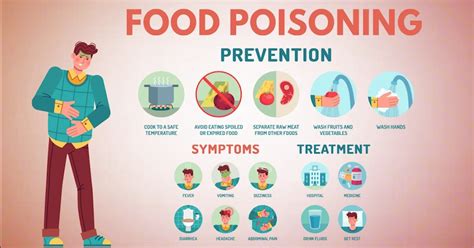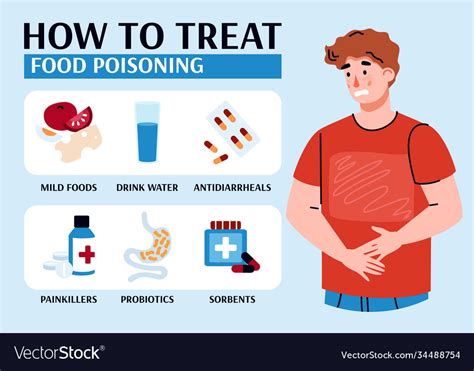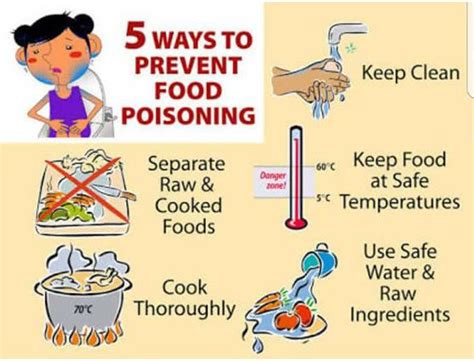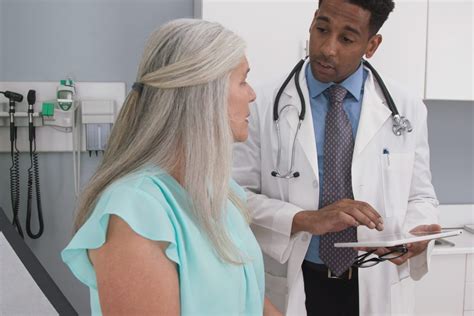Intro
Discover 5 effective food poisoning treatments, including natural remedies and medical interventions, to alleviate symptoms of foodborne illnesses, such as nausea, vomiting, and diarrhea, and promote a speedy recovery from bacterial and viral infections.
Food poisoning is a common health issue that affects millions of people worldwide every year. It occurs when we consume contaminated or toxic food, which can lead to a range of symptoms, from mild discomfort to life-threatening complications. Understanding the importance of proper food handling, storage, and cooking techniques is crucial in preventing food poisoning. However, when it does happen, knowing the effective treatments can significantly reduce the severity of the symptoms and promote a speedy recovery. In this article, we will delve into the world of food poisoning treatments, exploring the various options available to help you overcome this unpleasant condition.
The significance of seeking prompt treatment for food poisoning cannot be overstated. If left untreated, food poisoning can lead to dehydration, electrolyte imbalance, and even organ failure in severe cases. Moreover, some types of food poisoning, such as those caused by Salmonella or E. coli, can have long-term consequences, including kidney damage and reactive arthritis. Therefore, it is essential to be aware of the common symptoms of food poisoning, which include nausea, vomiting, diarrhea, abdominal cramps, and fever. By recognizing these symptoms early on, you can take the necessary steps to treat the condition and prevent further complications.
Food poisoning can be caused by a variety of factors, including bacteria, viruses, and parasites. The most common culprits include Salmonella, E. coli, Listeria, and Norovirus. These microorganisms can contaminate food at any stage of production, processing, or preparation, making it crucial to handle food safely and cook it thoroughly. In addition to proper food handling, there are several treatment options available to help alleviate the symptoms of food poisoning. From over-the-counter medications to home remedies and medical interventions, we will explore the various treatments that can help you recover from food poisoning.
Understanding Food Poisoning

Types of Food Poisoning
There are several types of food poisoning, each with its unique causes and symptoms. The most common types of food poisoning include: * Salmonella poisoning: caused by the Salmonella bacteria, which can contaminate poultry, meat, and dairy products. * E. coli poisoning: caused by the E. coli bacteria, which can contaminate undercooked ground beef, unpasteurized apple cider, and contaminated water. * Listeria poisoning: caused by the Listeria bacteria, which can contaminate soft cheeses, hot dogs, and deli meats. * Norovirus poisoning: caused by the Norovirus, which can contaminate food and water through human contact.Food Poisoning Treatments

Home Remedies
In addition to medical treatments, there are several home remedies that can help alleviate the symptoms of food poisoning. These include: * Ginger: ginger has natural anti-inflammatory properties that can help reduce nausea and inflammation. * Chamomile tea: chamomile tea can help soothe the stomach and reduce anxiety. * BRAT diet: following a BRAT diet, which consists of bananas, rice, applesauce, and toast, can help firm up stool and reduce diarrhea. * Probiotics: taking probiotics can help restore the balance of gut bacteria and promote a healthy digestive system.Preventing Food Poisoning

Food Safety Tips
In addition to proper food handling and storage, there are several food safety tips that can help prevent food poisoning. These include: * Checking expiration dates: checking the expiration dates of perishable foods can help ensure that they are safe to eat. * Avoiding raw or undercooked foods: avoiding raw or undercooked foods, especially for vulnerable populations like the elderly, pregnant women, and young children, can help reduce the risk of food poisoning. * Keeping raw foods separate: keeping raw foods separate from cooked and ready-to-eat foods can help prevent cross-contamination. * Cooking foods to the correct temperature: cooking foods to the recommended internal temperature can help kill bacteria and other microorganisms.Seeking Medical Attention

When to Call a Doctor
If you are unsure about the severity of your symptoms or the best course of treatment, it is always best to consult a doctor. A doctor can provide a proper diagnosis and recommend the most effective treatment plan. Additionally, if you experience any of the following, call a doctor: * If you have a weakened immune system or are taking immunosuppressive medications * If you are pregnant or breastfeeding * If you have a history of food allergies or intolerances * If you have recently traveled to a foreign country or consumed exotic foodsConclusion and Next Steps

We hope this article has provided you with valuable information and insights into the world of food poisoning treatments. If you have any questions or comments, please feel free to share them with us. Your feedback is important to us, and we would love to hear about your experiences with food poisoning. Share this article with your friends and family to help spread awareness about food poisoning prevention and treatment. Together, we can create a healthier and safer food environment for everyone.
What are the most common symptoms of food poisoning?
+The most common symptoms of food poisoning include nausea, vomiting, diarrhea, abdominal cramps, and fever.
How can I prevent food poisoning?
+You can prevent food poisoning by handling food safely, storing it properly, and cooking it thoroughly. Additionally, washing your hands frequently, especially after handling raw meat, poultry, or seafood, can help prevent the spread of microorganisms.
When should I seek medical attention for food poisoning?
+You should seek medical attention immediately if you experience severe vomiting or diarrhea that lasts for more than 3 days, fever above 101.5°F (38.6°C), signs of dehydration, blood in stool or vomit, or severe abdominal pain or tenderness.
Can food poisoning be treated with antibiotics?
+Yes, food poisoning can be treated with antibiotics if it is caused by bacteria. However, antibiotics are not effective against viral or parasitic food poisoning.
How long does it take to recover from food poisoning?
+The recovery time from food poisoning varies depending on the severity of the symptoms and the type of microorganism causing the infection. Most people recover from food poisoning within a few days, but some cases can take longer to resolve.
